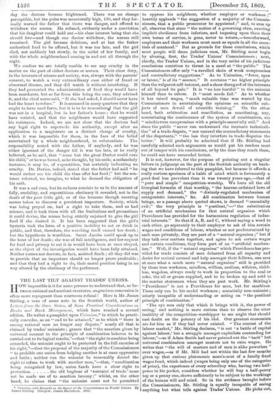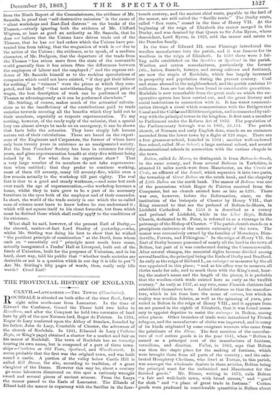THE LAST TILT AGAINST TRADES' UNIONS.
HOW impossible is it for some persons to understand that, as be- tween rational and sentient creatures, ungracious concession is often more repugnant than courteous refusal ! Here is Mr. James Stirling, a man of some note in the Scottish world, author of Letters from the Slave States, of Some Practical Considerations on Banks and Bank Management, which have reached a second edition. He writes a pamphlet upon Unionism,* in which he practi- cally concedes, as an "end to be attained," as to which " there is among rational men no longer any dispute," nearly all that is claimed by trades' unionists ; grants that " the sanction given by universal consent to the principle of combination behoves to be carried out to its logical results,"—that "the right to combine being conceded, the unionist ought to be protected in the full exercise of his right,"—that the proposal of the majority of the Commissioners " to prohibit one union from helping another is at once oppressive and futile ; neither can the unionist be reasonably denied the right to refuse to work with another man,"—that, " combination being recognized by law, union funds have a clear right to
protection the old bugbear of 'restraint of trade' must not be made use of to sanction larceny ;" whilst, on the other hand, he claims that "the unionist must not be permitted
• Unionism, with Remarks on the Report of the Commissioners on Trades' Unions. By James Stirling. Glasgow: James blaclehose. 1865.
to oppress his neighbour, whether employer or workman ;" heartily applauds " the suggestion of a majority of the Commis- sioners, that a public prosecutor be appointed ;" and, to sum up all, observes that since " the notion of a governing class, exacting implicit obedience from inferiors, and imposing upon them their own terms of service, is gone, never to return,—henceforward, employers and their workmen must meet as equals in all the essen- tials of manhood." But as grounds for these conclusions, which most people will deem judicious ones, Mr. Stirling must begin by abusing, first, the Trades' Unions' Commissioners ; next, chiefly, the Trades' Unions, and in the very midst of his judicious conclusions contrives to thrust in a snarl at "the public." The Commissioners offer only "a ravelled skein of weak compromises and contradictory suggestions." As to Unionism, "force, open or latent," is of its " essence." It contains " no higher principle than the vulgarest self-interest, and a sheer disregard of the interests of all beyond its pale." It is " no less hurtful " to the unionist himself than to others. It "must needs fail." As to whether it has raised wages, " much valuable time was wasted by the Commissioners in ascertaining the opinions on scientific sub- jects of men devoid of scientific training." On the other hand, both arbitration and conciliation, as sanctioning, nay, necessitating the continuance of the system of combination, are " mischievous compromises with a principle essentially evil." And since the public " never can understand the intricate technicali- ties" of a trade dispute, " nor unravel the contradictory statements of the disputants," "the less they interfere in trade disputes the better." It will probably be admitted that if Mr. Stirling had carefully selected such arguments as would put his readers most out of temper with his conclusions, or by the time they reach them, he could not have succeeded better.
It is not, however, for the purpose of pointing out a singular failure in judgmeit on the part of the Scottish authority on bank- ing that we have referred to this pamphlet, but because it affords a really curious specimen of a habit of mind which is fortunately a good deal less prevalent than it was twenty years ago,—that of " pure and simple " competition-worship. We have all the old liturgical formulae of that worship, " the heaven-ordained laws of supply and demand," the " divinely-regulated mechanism of antagonistic interests," &c. All combination between human beings, as a passage above quoted shows, is deemed " essentially evil ;" the very principle is " pestilent,"—" the substitution of an artificial mechanism for that natural organism which Providence has provided for the harmonious regulation of indus- trial interests." So that if A, B, and C, without saying a word to each other, go separately to their employer to ask of him certain wages and conditions of labour, whether or not predetermined by each man privately, they are part of a " natural organism ;" but if they talk over matters together, and agree to ask certain wages and certain conditions, they form part of an " artificial mechan- ism." Well, if the " natural organism" which Providence has pro- vided for trade consists of men debarred from all capacity and desire for mutual counsel and help amongst their fellows, one sees at once what a much more " natural organism" still is provided by those iron workmen, mindless, willless, soulless, wifeless, child- less, wageless, always ready to work in proportion to the coal or coke, the oil or grease supplied, and to be broken up and sold to the marine storesman when they are past work. Mr. Stirling's "Providence" is not a Providence for men, but for machines. These only can be his model workmen ; essentially non-unionist ; utterly incapable of understanding or acting on " the pestilent principle of combination."
The eye sees only that which it brings with it, the power of seeing,' and nothing is more curious than to observe the utter inability of the competition-worshipper to see aught that should cast doubt on the potency of his idol. Our greatest economists are for him as if they had never existed. " The contest of the labour market," Mr. Stirling declares, " is not a battle of capital against labour,' but a struggle amongst capitalists contending for labour,"—as if Adam Smith had never pointed out the "tacit" but universal combination amongst masters not to raise wages. He writes that " the will of masters and of men is alike powerless " over wages,—as if Mr. Mill had not within the last few months given up that curious plutonomic mare's-nest of a fatally fixed wages fund, which indeed (wages being only one of the categories of price), the experience of every schoolboy who, having two half- pence in his pocket, considers whether he will buy a half-penny top or a penny one, shows sufficiently to be subject to the workings of the human will and mind. So in the evidence brought before the Commissioners, Mr. Stirling is equally incapable of seeing anything but what tells against Trades' Unions. He picks out, from the Ninth Report of the Commissioners, the evidence of Mr. Samuda, in proof that "self-destructive unionism" is the cause of " silent workshops and East-End distress" on the banks of the Thames,—utterly ignoring both the evidence of Mr. Clifford Wigram, at least as good an authority as Mr. Samuda, that he does not believe that the Unions have driven trade out of the Thames, that he has not had orders which the Unions have pre- vented him from taking, that the stagnation of work is not due to the action of the Unions ; the evidence, so to speak, of a medium character, of Mr. Dudgeon, that the departure of the trade from the Thames "has arisen more from the state of the mercantile world generally than it has arisen ftom the differences between the employers of labour and the employed ;" and the express evi- dence of Mr. Samuda himself as to the reckless speculations of companies which could not have existed, " if they got their labour for nothing," so " ruinous" were the prices at which they com- peted, and his belief "that notwithstanding the present price of wages, the best description of work can be performed on the Thames as advantageously as it can be performed elsewhere."
Mr. Stirling, of course, makes much of the actuaries' calcula- tions as to the insufficiency of the contributions paid to trade societies towards securing all the benefits which they hold out to their members, especially as respects superannuation. To say nothing, however, of the ready reply of the unionist, that a special levy can almost always be made on an emergency, it can be shown that facts belie the actuaries. They have simply left human nature out of their calculations. These are based on the experi- ence of the Engineers and Carpenters, the former of whom have only been twenty years in existence as an amalgamated society. But the Iron Founders' Society has been in existence for sixty years, and gives superannuation benefit at sixty-five without being ruined by it. For what does its experience show? That a very large number of its members do not take superannua- tion when entitled ; that they prefer to continue working, most of them till seventy, many till seventy-five, whilst even a few remain actually in the workshop till past eighty. The real fact is that to a good and steady workman,—and none but such -ever reach the age of superannuation,—the workshop becomes a home, whilst they in turn grow to be a part of its necessary furniture in the eyes both of the employer and of their comrades. In short, the world of the trade society is one which the so-called man of science must learn to know before he can understand it ; -which will not square itself to his closet formula, but from which must be derived those which shall really apply to the conditions of its existence.
What shall be said, however, of the present Earl of Derby,- -the shrewd, matter-of-fact Lord Stanley of yesterday,—who, whilst Mr. Stirling was doing his best to show that he wished 4 the pestilent principle of combination" at the Devil, from whom such an " essentially evil " principle must needs have come, actually inaugurated a Trades' Hall at Liverpool, built out of the funds of Unionism, built for the purposes of Unionism, and in his hard, short way, told his public that " whether trade societies are -desirable or not is a question which in our day it is idle to put "? Are Mr. Stirling's fifty pages of words, then, really only idle words? Cruel Earl!



































 Previous page
Previous page